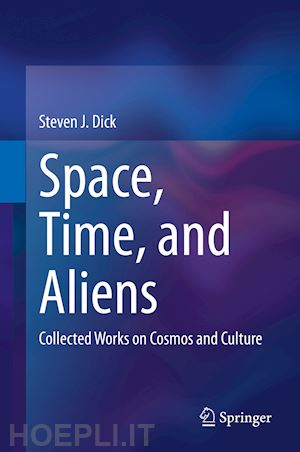

Questo prodotto usufruisce delle SPEDIZIONI GRATIS
selezionando l'opzione Corriere Veloce in fase di ordine.
Pagabile anche con Carta della cultura giovani e del merito, 18App Bonus Cultura e Carta del Docente
In this comprehensive and interdisciplinary volume, former NASA Chief Historian Steven Dick reflects on the exploration of space, astrobiology and its implications, cosmic evolution, astronomical institutions, discovering and classifying the cosmos, and the philosophy of astronomy. The unifying theme of the book is the connection between cosmos and culture, or what Carl Sagan many years ago called the “cosmic connection.”
As both an astronomer and historian of science, Dr. Dick has been both a witness to and a participant in many of the astronomical events of the last half century. This collection of papers presents his reflections over the last forty years in a way accessible to historians, philosophers, and scientists alike. From the search for alien life to ongoing space exploration efforts, readers will find this volume full of engaging topics relevant to science, society, and our collective future on planet Earth and beyond.Epigraph
Dedication
Preface: Cosmos and Culture
Part I. The Biological Universe
Introduction
1. Plurality of Worlds: A Persistent Theme in Western Civilization
2. The Twentieth Century History of the Extraterrestrial Life Debate: Major Themes
3. From the Physical World to the Biological Universe: Historical Developments Underlying the Search forExtraterrestrial Intelligence (SETI)
4. The Biophysical Cosmology: The Place of Bioastronomy in the History of Science
5. The Biological Universe Revisited
6. Back to the Future: SETI Before the Space Age
7. The Drake Equation in Context
Part II. Cosmic Evolution and Implications of Alien Life
Introduction
8. Cosmic Evolution: History, Culture, and Human Destiny
9. Consequences of Success in SETI: Lessons from the History of Science10. Cultural Aspects of Astrobiology: A Preliminary Reconnaissance at the Turn of the Millennium
11. The Role of Anthropology in SETI: An Historical View12. Bringing Culture to Cosmos: Cultural Evolution, the Postbiological Universe, and SETI
13. Toward a Constructive Naturalistic Cosmotheology
14. Astroethics and Cosmocentrism
15. Should We Message ET and Is an Asilomar Consultation Process Possible
16. Astrobiology and Society: An Overview at the Beginning of the 21st CenturyPart III. The Exploration of Space
Introduction
17. Exploring the Unknown: 50 Years of NASA History
18. Exploration, Discovery and Culture: NASA’s Role in History
19. Space, Time and Aliens: The Role of Imagination in Outer Space
20. The Impact of the Hubble Space Telescope21. The Decision to Cancel the Hubble Space Telescope Servicing Mission (SM4) and its Reversal
22. Reflections on French-American Relations in Space, 1957–1975
Part IV. Measuring the Universe: Goals, Institutions, Techniques
Introduction
23. Measuring the Universe: A Brief History of Astrometry
24. Pulkovo Observatory and the National Observatory Movement25. John Quincy Adams, the Smithsonian Bequest, and the Origins of the U. S. Naval Observatory
26. The First Time Balls, the First North American Time Ball
27. The U. S. Naval Astronomical Expedition of James Melville Gilliss in the Southern Hemisphere, 1849-185228. Measuring the Astronomical Unit: The American Transit of Venus Expeditions of 1874 and 1882
29. Geodesy, Time, and the Markowitz Moon Camera: An Interwoven International Geophysical YearStory
Part V. Discovering, Classifying, and Understanding the Cosmos
Introduction
30. Pluto, Discovery, and Classification in Astronomy
31. Astronomy’s Three Kingdoms: A Comprehensive Classification System for Astronomy
32. The Discovery of Polar Motion and its Importance
33. Observation and Interpretation of the Leonid Meteors over the Last Millennium
34. The Discovery and Exploration of the Moons of Mars
35. The Universe and Alfred Russel Wallace36. Discovering a New Realm of the Universe: Hubble, Galaxies, and Classification
Part VI The Philosophy of Astronomy, Cosmology, and Astrobiology
Introduction
37. The Philosophy of Astronomy, Cosmology, and Astrobiology: A Preliminary Reconnaissance
38. Critical Issues in the History, Philosophy, and Sociology of Astrobiology
39. Lessons Learned from the Twentieth-Century Extraterrestrial Life Debate40. Cosmology and Biology, an Entangled Web?
Part VII Envoi: Reflections on Humanity and the Cosmos
41. Interstellar Humanity
42. The Consolations of Astronomy and the Cosmic Perspective
Appendix 1 Testimony Before the United States Congress
Appendix 2 Sources and Permissions











Il sito utilizza cookie ed altri strumenti di tracciamento che raccolgono informazioni dal dispositivo dell’utente. Oltre ai cookie tecnici ed analitici aggregati, strettamente necessari per il funzionamento di questo sito web, previo consenso dell’utente possono essere installati cookie di profilazione e marketing e cookie dei social media. Cliccando su “Accetto tutti i cookie” saranno attivate tutte le categorie di cookie. Per accettare solo deterninate categorie di cookie, cliccare invece su “Impostazioni cookie”. Chiudendo il banner o continuando a navigare saranno installati solo cookie tecnici. Per maggiori dettagli, consultare la Cookie Policy.